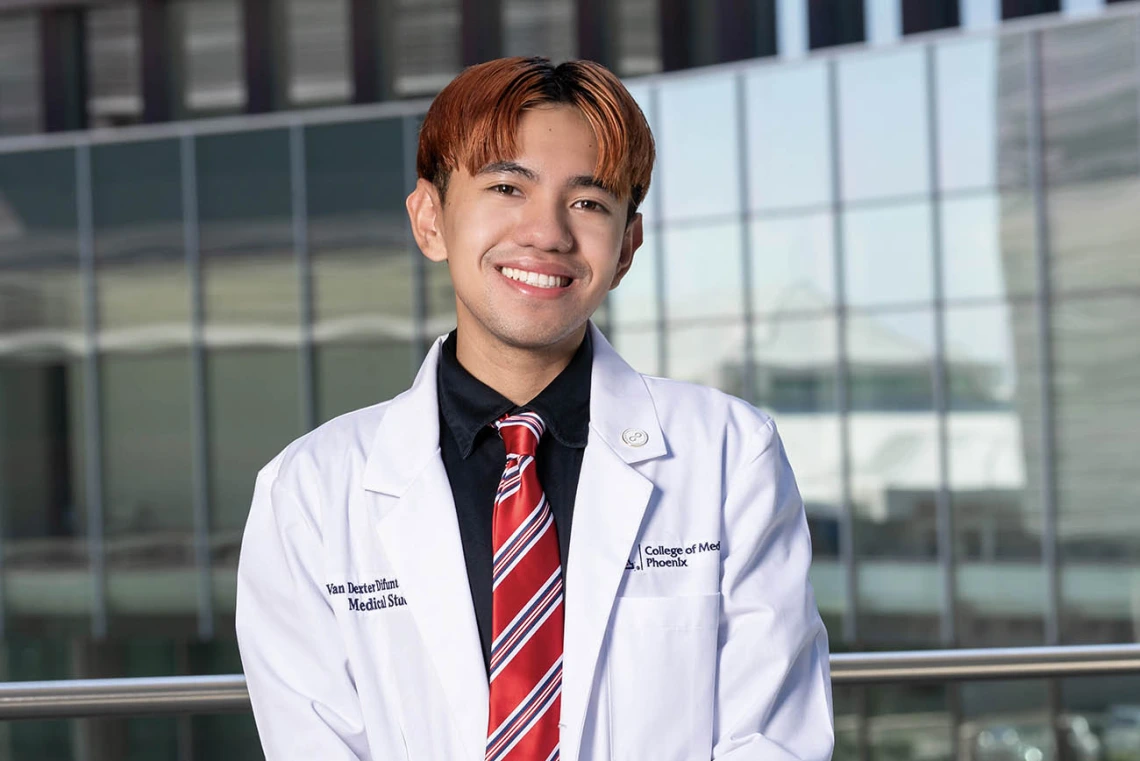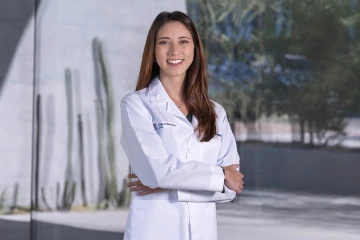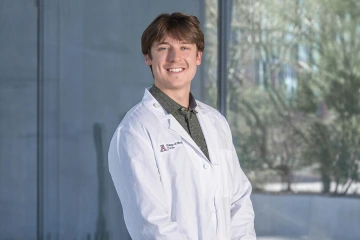Future primary care doctors receive scholarships for medical school
Twenty-five medical students are the newest recipients of scholarships through the University of Arizona Health Sciences Primary Care Physician Scholarship Program.

Van Dexter Difuntorum Calo is one of 11 medical students at the UArizona College of Medicine – Phoenix to receive a Primary Care Physician Scholarship.
Twenty-five aspiring physicians are the latest to benefit from the University of Arizona Health Sciences Primary Care Physician Scholarship Program, which continues to address two critical issues in health care: Arizona’s shortage of primary care physicians and a rising amount of debt for medical students.
The Primary Care Physician Scholarship Program awarded scholarships to 14 students in the UArizona College of Medicine – Tucson and 11 in the UArizona College of Medicine – Phoenix. The scholarships, awarded annually, are available to incoming and current students. They allow medical students to pursue careers in primary care without worrying about how they will repay medical school debt.
Marin Carter is a second-year medical student in the UArizona College of Medicine – Tucson. She has been driven to become a doctor since a primary care physician found her father’s heart murmur and helped him get the care he needed to extend his life.

Marin Carter, a second-year medical student at the UArizona College of Medicine – Tucson, is one of 14 students from the college to receive a Primary Care Physician Scholarship.
“Our PCP saved his life, and aside from the individual benefit my family has seen from having an amazing PCP, I’ve seen the benefit primary care has on entire communities, too,” said Carter, who worked in Flagstaff at a Federally Qualified Health Center prior to medical school and a participated in a Rural Health Professions Program this past summer. “I’ve seen and felt the physician shortage in primary care. I believe that everyone should have access to the quality primary care my family has received, and I want to provide that to the community. There’s so much value in preventive medicine and longitudinal care.”
Van Dexter Difuntorum Calo, who is enrolled at the UArizona College of Medicine – Phoenix, has dreamed of practicing as a doctor since his youth in the Philippines.
“Growing up in a rural area in a developing country and witnessing the challenges in health care access firsthand, I knew I wanted to serve similar communities here in the United States,” Difuntorum Calo said. “With the scholarship, I will be able to continue my part in meeting the unique needs these communities face. I look forward to being on the frontlines for those who have been longing for and are overdue for high-quality primary care services.”

Noah Linskey, a first-year student at the UArizona College of Medicine –Tucson, is one of 25 new recipients of a Primary Care Physician Scholarship.
Scholarships are available for students who intend to pursue careers in a primary care field, including family medicine, general internal medicine, geriatric medicine, general pediatrics, psychiatry, obstetrics and gynecology, or general surgery. Each scholarship recipient agrees to practice medicine in a federally designated underserved community for at least two years and up to four years after graduation and residency training.
The Primary Care Physician Scholarship Program is currently supporting 92 active medical students. An additional 45 scholarship recipients have graduated and are in various stages of residency training.
“Volunteering and working in Arizona allowed me to empathize with the disparities that many patients face when seeking quality and affordable care,” said scholarship recipient Noah Linskey, a first-year student at the College of Medicine – Tucson who worked as a translator in an urgent care clinic. “My goals include representing my patients inside and outside of the clinic through becoming active in patient advocacy and policy while raising the standard of care as an empathic and culturally relative provider.”
Contact
Phil Villarreal
UArizona Health Sciences
520-403-1986
pvillarreal@arizona.edu

